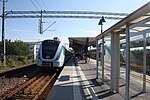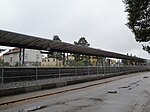Gamla Östberga
Gamla Östberga ("Old East Hills") is an area of southern Stockholm, Sweden. It encompasses the older and eastern part of Östberga. Östbergastaden ("city of East Hills") was built by HSB in 1957–59 as an experimental district with exemptions from parts of the existing construction legislation. The buildings are long 3–4 floor lamellae, as well as three nine-floor point buildings erected to mark the district and the location of central east hills. This district is an early example of modern element construction using concrete, and eternit to some extent. The district was first restored in 1979 when the buildings were fitted with additional insulation. In the second restoration in 1993, all building fronts were repaired.
Excerpt from the Wikipedia article Gamla Östberga (License: CC BY-SA 3.0, Authors).Gamla Östberga
Stamgatan, Stockholm Östberga (Enskede-Årsta-Vantörs stadsdelsområde)
Geographical coordinates (GPS) Address Nearby Places Show on map
Geographical coordinates (GPS)
| Latitude | Longitude |
|---|---|
| N 59.285928 ° | E 18.038647 ° |
Address
Stamgatan
125 74 Stockholm, Östberga (Enskede-Årsta-Vantörs stadsdelsområde)
Sweden
Open on Google Maps










